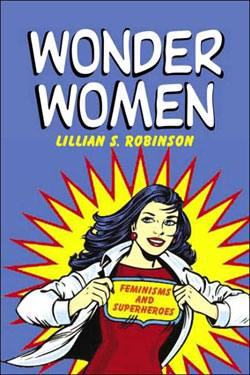Books
Wonder Women: Feminism and Super Heroes
By Hervé St-Louis
May 31, 2007 - 23:53
Wonder Women is about super heroines and feminism. It is at once a critical essay on the evolution, repression and representation of feminism in North American comic books, but also a history of the female super heroine. Much of the book is devoted to Wonder Woman, the archetype of super feminism. A comic book fan as a child, Robinson attempts to bring meaning to the development of super heroines from the 1940s Golden Age of comic books to the present.
Much of the source material of the book are actual comics, which is refreshing as Robinson adds a different interpretation from the norm and other feminist text to characters like Wonder Woman. The latter is spotlighted in much of the book as the epitome of feminism. Starting with heavy feminist theory, Robinson shows how William Moulton Marston, the character’s creator had great design for the comic book.
Robinson discusses some archetypes of strong mythical and fictional women, who invariably fall because they must fit within society’s overall structure. This is a theme that has also been repeated several times in both
Action Chicks and
Girls Who Bite Back. The author’s examination of Wonder Woman is solid as she spends as much time detailing her costume and its significance as she does her powers and other features.
For Robinson, the secret identity of Diana Prince, subjugated to
Steve Trevor, the man she loves is the point of defeat of the character. She blames the lack of understanding of later writers in writing Wonder Woman, even during her 1970s feminist times. Still, the text offers one of the best explanations of what differentiates Wonder Woman from Superman and Batman, the other member of DC Comics’s trinity. Superman is about science fiction, Batman about detective melodrama and Wonder Woman about epic stories.
Robinson also looks at other important comic book characters, such as Mary Marvel, whom she describes as a marketing ploy for teenage girls, the Black Cat, once of the first costumed femme fatale, and several Marvel Comics strong ladies. Of all She-Hulk fares the best, according to Robinson, because she is both sexy, self aware and even post feminist. She represents everything adolescent males want, while being independent.
This was a good text, but the writing often buries the best observations under tons of academia talks and mumble jumble self-important copy and personal recollections. A sharper more direct style would have made this book more compelling.
Last Updated: January 17, 2025 - 08:20
